Module 8 Time off单词讲解课件+嵌入音频(共18张PPT)
文档属性
| 名称 | Module 8 Time off单词讲解课件+嵌入音频(共18张PPT) | 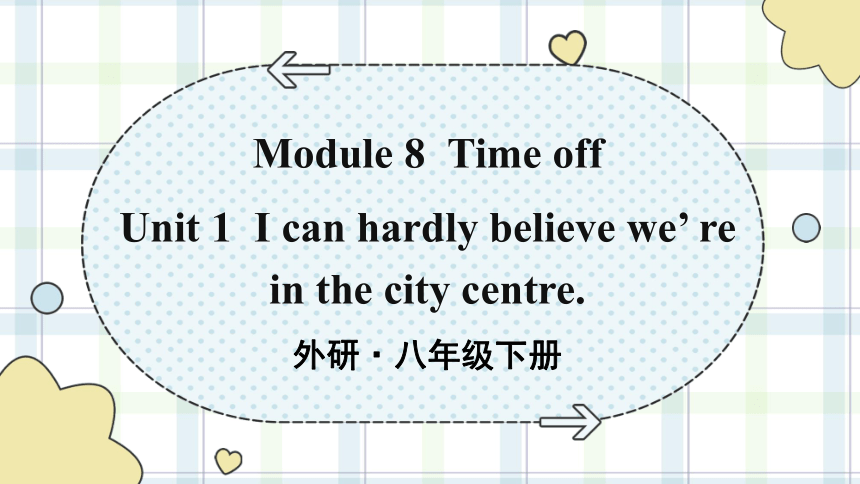 | |
| 格式 | pptx | ||
| 文件大小 | 8.1MB | ||
| 资源类型 | 教案 | ||
| 版本资源 | 外研版 | ||
| 科目 | 英语 | ||
| 更新时间 | 2023-05-05 12:42:31 | ||
图片预览


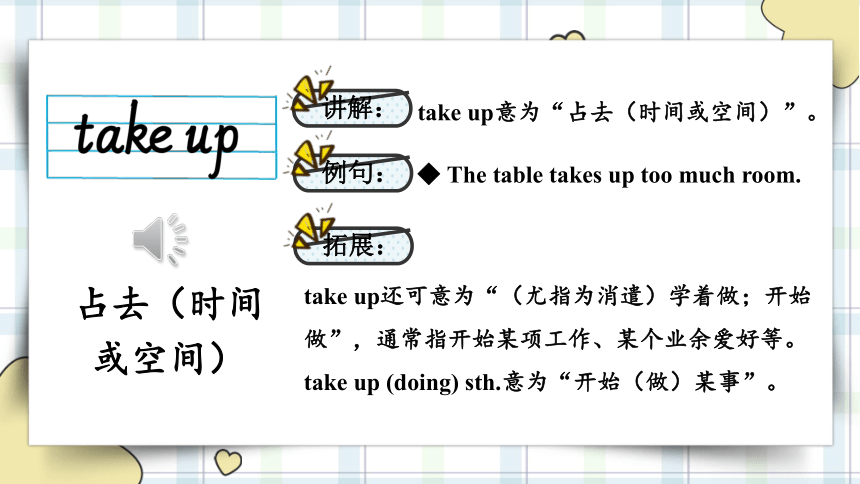
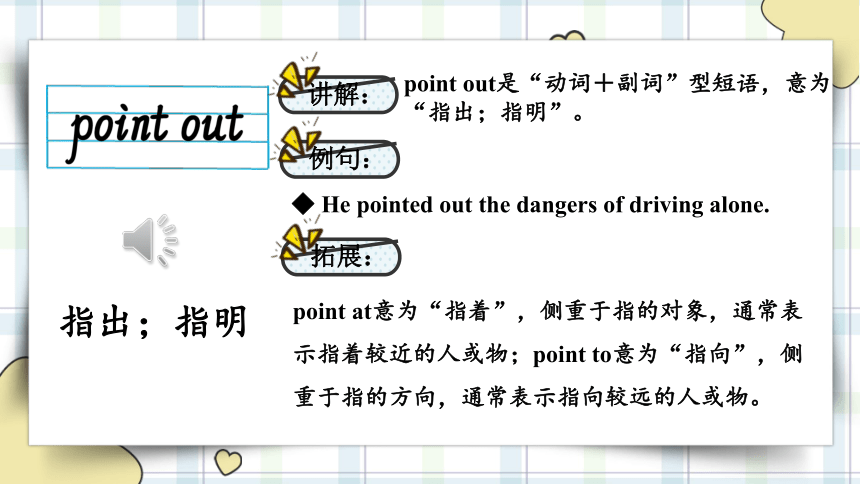
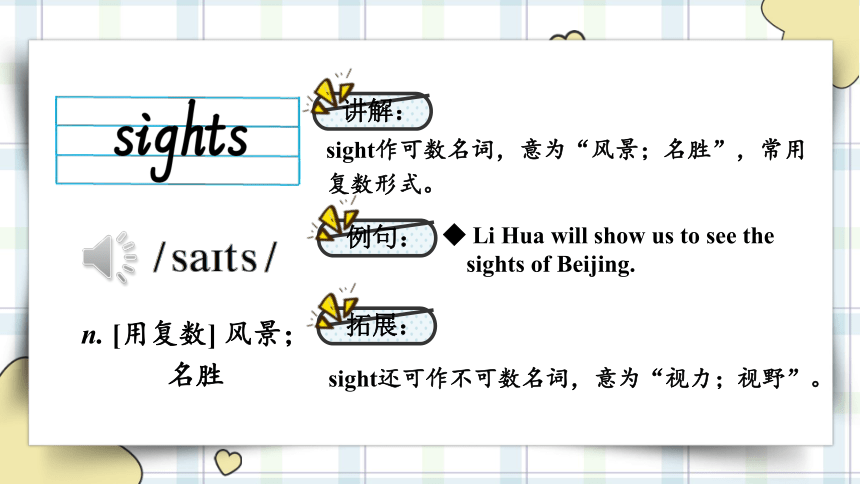
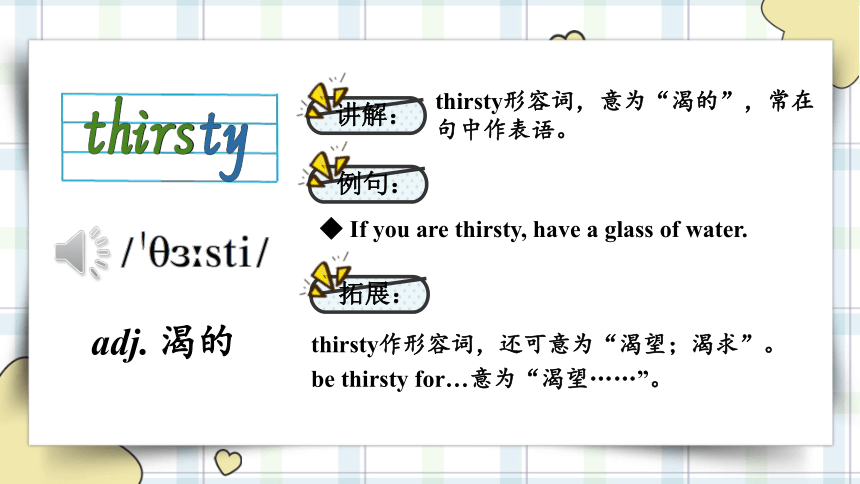
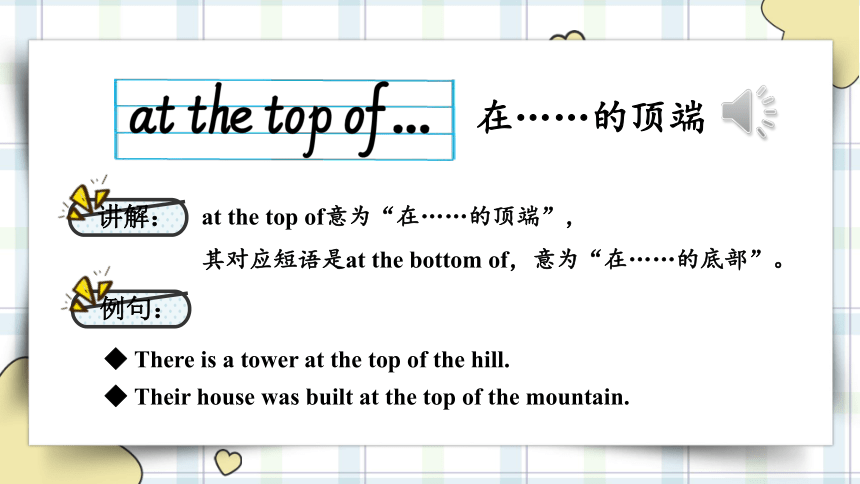
文档简介
(共18张PPT)
Module 8 Time off
外研·八年级下册
Unit 1 I can hardly believe we’ re in the city centre.
hardly副词,意为“几乎不;几乎没”,表示否定意义,它不是hard的副词形式。在句中常位于助动词、be动词和情态动词之后,实义动词之前。
◆ There is hardly any milk left in the fridge.
hardly 用于反意疑问句中时,附加疑问部分要用肯定形式。
讲解:
adv. 几乎不;
几乎没
例句:
注意:
take up意为“占去(时间或空间)”。
◆ The table takes up too much room.
take up还可意为“(尤指为消遣)学着做;开始做”,通常指开始某项工作、某个业余爱好等。take up (doing) sth.意为“开始(做)某事”。
占去(时间
或空间)
讲解:
例句:
拓展:
point out是“动词+副词”型短语,意为“指出;指明”。
◆ He pointed out the dangers of driving alone.
point at意为“指着”,侧重于指的对象,通常表示指着较近的人或物;point to意为“指向”,侧重于指的方向,通常表示指向较远的人或物。
指出;指明
讲解:
例句:
拓展:
sight作可数名词,意为“风景;名胜”,常用复数形式。
◆ Li Hua will show us to see the
sights of Beijing.
sight还可作不可数名词,意为“视力;视野”。
n. [用复数] 风景;
名胜
讲解:
例句:
拓展:
thirsty形容词,意为“渴的”,常在句中作表语。
◆ If you are thirsty, have a glass of water.
thirsty作形容词,还可意为“渴望;渴求”。be thirsty for…意为“渴望……”。
adj. 渴的
讲解:
例句:
拓展:
at the top of意为“在……的顶端”,
其对应短语是at the bottom of,意为“在……的底部”。
◆ There is a tower at the top of the hill.
◆ Their house was built at the top of the mountain.
在……的顶端
讲解:
例句:
waste作及物动词,意为“浪费;滥用”。常见用法如下:
waste time/money on sb./sth. 在某人/某事上浪费时间/金钱
waste time/money (in) doing sth. 浪费时间/金钱做某事
◆ Don’t waste water.
(1) waste还可作名词,意为“浪费;滥用”。 a waste of…
意为“浪费……”。
(2) waste还可作形容词,意为“无用的;废弃的”。
v. 浪费;滥用 n. 浪费;滥用
讲解:
例句:
拓展:
square作形容词,意为“平方的”,用于数字后表示面积。
◆ The Forbidden City takes up 720,000 square
meters in the heart of Beijing.
square还可作名词,意为“平方;正方形;广场”。
adj.(表示面积单位)平方的
讲解:
例句:
拓展:
◆ Sarah lives about 100 kilometres out in a village.
n. 千米;公里
例句:
shape作名词,意为“外形;形状”。
◆ Their shapes look like different kinds of animals.
in shape 在外形上;在形状上
in the shape of 呈……的形状
out of shape 变形的;走样的
与shape相关的常见短语如下
n. 外形;
形状
讲解:
例句:
拓展:
human作可数名词,意为“人”,相当于human being,其复数形式为humans。
◆ A human can talk, but an animal cannot.
human还可作形容词,意为“人的;人类的”。
n. 人
讲解:
例句:
拓展:
wake动词,意为“唤醒;醒来”。 wake up是“动词+副词”型短语,若其后所接宾语是人称代词,必须放在wake和up之间;若其后所接宾语是名词,放在up之前或之后均可。
◆ Mary wakes up early every morning.
v. 唤醒;醒来
过去式:woke → 过去分词: woken
讲解:
例句:
唤醒某人
wake sb. up意为“唤醒某人”。
◆ I will have a meeting this
afternoon. Please wake
me up at 2:00 pm.
讲解:
例句:
somebody不定代词,意为“某人;有人”,相当于someone,常用于肯定句中。在否定句或疑问句中要用anybody,相当于anyone。
◆ Somebody is waiting for you at the gate. (somebody作主语时,谓语动词用单数形式。)
somebody还可作名词,意为“重要人物”。
pron. 某人;有人
讲解:
例句:
拓展:
about作副词,意为“向四周;向各处”。
◆ Her books are lying about on the floor.
(1) about 作副词,还可意为“大约;左右;附近;周围”。
(2) about 还可作介词,意为“关于”。
adv. 向四周;
向各处
讲解:
例句:
拓展:
◆ This path leads to the summit
(山顶).
n. 小路;路径
例句:
pull作及物动词,意为“(用手)拉,牵,扯”。其反义词为push,意为“推”。
◆ Don’t push the door, Tom.
Please pull it.
pull down 拆毁(建筑物等)
pull over (把车)开到路边
pull together 齐心协力
与pull相关的常见短语如下:
v.(用手)拉,
牵,扯
讲解:
串记:
拓展:
Module 8 Time off
外研·八年级下册
Unit 1 I can hardly believe we’ re in the city centre.
hardly副词,意为“几乎不;几乎没”,表示否定意义,它不是hard的副词形式。在句中常位于助动词、be动词和情态动词之后,实义动词之前。
◆ There is hardly any milk left in the fridge.
hardly 用于反意疑问句中时,附加疑问部分要用肯定形式。
讲解:
adv. 几乎不;
几乎没
例句:
注意:
take up意为“占去(时间或空间)”。
◆ The table takes up too much room.
take up还可意为“(尤指为消遣)学着做;开始做”,通常指开始某项工作、某个业余爱好等。take up (doing) sth.意为“开始(做)某事”。
占去(时间
或空间)
讲解:
例句:
拓展:
point out是“动词+副词”型短语,意为“指出;指明”。
◆ He pointed out the dangers of driving alone.
point at意为“指着”,侧重于指的对象,通常表示指着较近的人或物;point to意为“指向”,侧重于指的方向,通常表示指向较远的人或物。
指出;指明
讲解:
例句:
拓展:
sight作可数名词,意为“风景;名胜”,常用复数形式。
◆ Li Hua will show us to see the
sights of Beijing.
sight还可作不可数名词,意为“视力;视野”。
n. [用复数] 风景;
名胜
讲解:
例句:
拓展:
thirsty形容词,意为“渴的”,常在句中作表语。
◆ If you are thirsty, have a glass of water.
thirsty作形容词,还可意为“渴望;渴求”。be thirsty for…意为“渴望……”。
adj. 渴的
讲解:
例句:
拓展:
at the top of意为“在……的顶端”,
其对应短语是at the bottom of,意为“在……的底部”。
◆ There is a tower at the top of the hill.
◆ Their house was built at the top of the mountain.
在……的顶端
讲解:
例句:
waste作及物动词,意为“浪费;滥用”。常见用法如下:
waste time/money on sb./sth. 在某人/某事上浪费时间/金钱
waste time/money (in) doing sth. 浪费时间/金钱做某事
◆ Don’t waste water.
(1) waste还可作名词,意为“浪费;滥用”。 a waste of…
意为“浪费……”。
(2) waste还可作形容词,意为“无用的;废弃的”。
v. 浪费;滥用 n. 浪费;滥用
讲解:
例句:
拓展:
square作形容词,意为“平方的”,用于数字后表示面积。
◆ The Forbidden City takes up 720,000 square
meters in the heart of Beijing.
square还可作名词,意为“平方;正方形;广场”。
adj.(表示面积单位)平方的
讲解:
例句:
拓展:
◆ Sarah lives about 100 kilometres out in a village.
n. 千米;公里
例句:
shape作名词,意为“外形;形状”。
◆ Their shapes look like different kinds of animals.
in shape 在外形上;在形状上
in the shape of 呈……的形状
out of shape 变形的;走样的
与shape相关的常见短语如下
n. 外形;
形状
讲解:
例句:
拓展:
human作可数名词,意为“人”,相当于human being,其复数形式为humans。
◆ A human can talk, but an animal cannot.
human还可作形容词,意为“人的;人类的”。
n. 人
讲解:
例句:
拓展:
wake动词,意为“唤醒;醒来”。 wake up是“动词+副词”型短语,若其后所接宾语是人称代词,必须放在wake和up之间;若其后所接宾语是名词,放在up之前或之后均可。
◆ Mary wakes up early every morning.
v. 唤醒;醒来
过去式:woke → 过去分词: woken
讲解:
例句:
唤醒某人
wake sb. up意为“唤醒某人”。
◆ I will have a meeting this
afternoon. Please wake
me up at 2:00 pm.
讲解:
例句:
somebody不定代词,意为“某人;有人”,相当于someone,常用于肯定句中。在否定句或疑问句中要用anybody,相当于anyone。
◆ Somebody is waiting for you at the gate. (somebody作主语时,谓语动词用单数形式。)
somebody还可作名词,意为“重要人物”。
pron. 某人;有人
讲解:
例句:
拓展:
about作副词,意为“向四周;向各处”。
◆ Her books are lying about on the floor.
(1) about 作副词,还可意为“大约;左右;附近;周围”。
(2) about 还可作介词,意为“关于”。
adv. 向四周;
向各处
讲解:
例句:
拓展:
◆ This path leads to the summit
(山顶).
n. 小路;路径
例句:
pull作及物动词,意为“(用手)拉,牵,扯”。其反义词为push,意为“推”。
◆ Don’t push the door, Tom.
Please pull it.
pull down 拆毁(建筑物等)
pull over (把车)开到路边
pull together 齐心协力
与pull相关的常见短语如下:
v.(用手)拉,
牵,扯
讲解:
串记:
拓展:
同课章节目录
- Module 1 Feelings and impressions
- Unit 1 It smells delicious.
- Unit 2 I feel nervous when I speak Chinese .
- Unit 3 Language in use
- Module 2 Experiences
- Unit 1 I've also entered lots of speaking competi
- Unit 2 They have seen the Pyramids.
- Unit 3 Language in use
- Module 3 Journey to space
- Unit 1 Has it arrived yet?
- Unit 2 We have not found life on any other planet
- Unit 3 Language in use
- Module 4 Seeing the docto
- Unit 1 I haven't done much exercise since I got m
- Unit 2 We have played football for a year now
- Unit 3 Language in use
- Module 5 Cartoons
- Unit 1 It's time to watch a cartoon.
- Unit 2 Tintin has been popular for over eighty yea
- Unit 3 Language in use
- Revision module A
- Module 6 Hobbies
- Unit 1 Do you collect anything ?
- Unit 2 Hobbies can make you grow as a person.
- Unit 3 Language in use
- Module 7 Summer in Los Angeles
- Unit 1 Please write to me and send me some photos
- Unit 2 Fill out a form and come to learn English
- Unit 3 Language in use
- Module 8 Time off
- Unit 1 I can hardly believe we are in the city ce
- Unit 2 We thought somebody was moving about
- Unit 3 Language in use
- Module 9 Friendship
- Unit 1 Could I ask if you've mentioned this to he
- Unit 2 I believe that the world is what you think
- Unit 3 Language in use
- Module 10 On the radio
- Unit 1 I hope that you can join us one day
- Unit 2 It seemed that they were speaking to me in
- Unit 3 Language in use
- Revision module B
